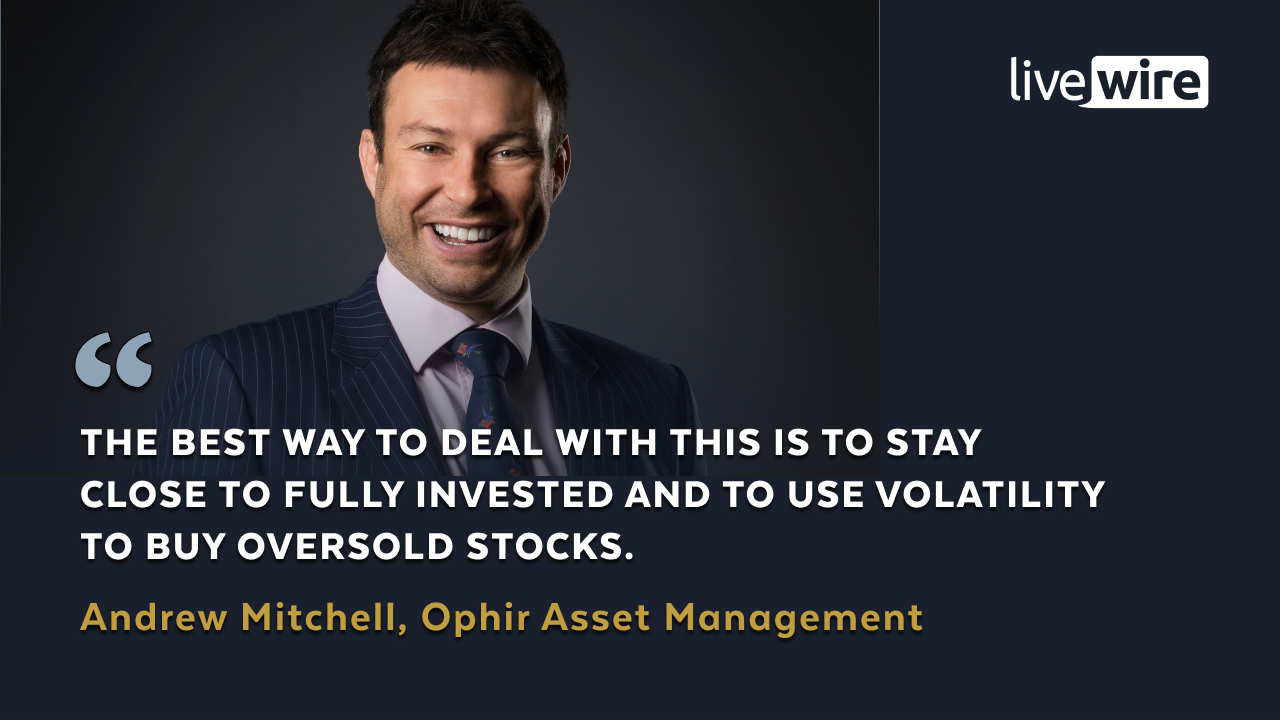The best way to deal with a crisis
Since the depths of pessimism in late March, the ASX200 has gained over a third in value and traded lower in only one of the last twelve weeks. No one could have predicted what was in store as we went into 2020, so how could investors have prepared? When we caught up with Andrew Mitchell from Ophir Asset Management recently, he told us:
“The best way to deal with this is to stay close to fully invested, and then use the volatility to buy the stocks that are being sold off way too much. Because the risk of going to 100% cash and then having to redeploy it from a coordinated stimulus is just far too great. This crisis reinforced that you want to never, ever bet against the market long term”.
The boutique manager, founded by Andrew Mitchell and Steven Ng, are advocates of sustaining high levels of alignment with investors by continuing to invest personally in Ophir’s funds. Ophir also maintains strict capacity constraints on their three funds, a principle that they believe is key to delivering consistent outperformance in their preferred small and mid-cap investment universe.
The Australian Financial Review recently listed the top ten best performing Australian equity funds over the past 12 months, based on Morningstar data. Ophir occupied two of the top ten positions. Short-term performance can be fleeting and it's Ophir’s impressive long-term track record that indicates their principles of alignment, capacity constraint and rigorous research are paying off.
I reached out to Andrew Mitchell to find out how Ophir is positioned, the structural trends they are observing and a lesson he has learned from the recent crisis. He also talks through a company that has impressed him during the recent volatility.
An edited transcript of our discussion is set out below.

James Marlay
When you're telling people for the first time about Ophir and how you think about investing, what do you tell them?
Andrew Mitchell
What we're looking for is a great entrepreneurial manager with a unique product that is taking share in a big market. If that business can generate significant margins and cash, then they can reinvest that back into the business and continue to grow. If they have the potential to expand in big offshore markets, then that is the nirvana for us. Rather than selling to 25 million people in Australia, sell to seven billion people globally. We're attracted to those businesses that have that global scope.
In small-caps, it's all about the person you're investing with.
James Marlay
What's your base case on the outlook for equities at the moment? I know you are generally bottom-up, but how you're thinking about the broader market and valuations at the moment?
Andrew Mitchell
What we see at the moment is coordinated fiscal and monetary stimulus right across the world. If you have a look at the government spending to GDP right now, you would think Australia or the globe is at war, because we haven't seen this amount of fiscal stimulus since the world wars in the early part of the 20th century.
Right now, the governments and the central banks are providing us with a bridge. In the case of Australia, with packages like JobKeeper, we might get this government support through to September. We are trying to balance how the economy will look when the stimulus is turned off.
James Marlay
How you are positioning your portfolios and how does this reflect your base case thinking at the moment?
Andrew Mitchell
We never really changed our cash position during the sell-off of COVID-19. It's obviously good to get the performance that we did, especially in March. In times like these, there are enormous amounts of volatility. We're able to buy companies on their fundamentals that we believe are doing a lot better than the market thinks.
Given we don't know where we're going to be when the stimulus runs out, we're not going too far in the camp that everything's going to look rosy on the other side. Likewise, we're not going too far in the camp that everything's going to be a disaster.
We're fundamentally picking stocks that we think are going to continue to power on no matter what. So, they don't need the stimulus to survive. They don't need the stimulus to avoid recapitalising their balance sheet. These are good businesses that are taking market share, and they're agnostic in terms of what part of the economic cycle we're in.
We're focusing on those companies, and we've added a little bit to some retailers that we think are not going to need to recapitalise. They're good businesses, but they're going to be stronger on the other side. If we do go into an economic recession, their competitors will go out of business, and they're going to take a significant amount of market share because they're the strongest in their industry. We have a few of those, but we're focusing on the companies that are going to do well no matter what.
James Marlay
One of the things that you pride yourselves on is rolling your sleeves up and getting out there and doing a lot of in the field face-to-face interaction. How's that been impacted?
Andrew Mitchell
I think we're fortunate that technology has put businesses in a good position to deal with the COVID-19 lockdown. We're able to do lots of face-to-face meetings, albeit they're over Zoom or Microsoft Teams. We're able to speak to management teams when things are changing, and you need to have good dialogue, it hasn't really affected us.
I think on the plus side, as a team, our productivity has improved working from home, and I know a lot of companies that I speak with have had a similar experience.
I think it's going to change the landscape for how we work. Not only just a general statement in terms of businesses, but also the funds management industry. Is it necessary that we are working in each other's pockets 24/7?
James Marlay
What structural growth opportunities have become more entrenched, and are there any new ones you have found?
Andrew Mitchell
The greatest structural trend of all is the one that's driving all of this, and it's just simply technology.
In the 1920s, in the United States, if you were in the top 500 companies, you were there on average, for 60 years. In the 1960s, if you were in the top 500 companies in the US, you were there for 30 years. It's now down to 14 years. It's getting shorter each time, and these incumbent large businesses are facing threats from all different angles.
These companies that are the threats to the established businesses are starting out as small-caps. The technology that encompasses everything is enabling these smaller companies to take market share from the incumbents.
We wrote a report on global growers and spoke with the CEOs and directors of Australian companies that have been the multi-baggers of the last decade. The common theme is that they have all gone offshore and done very well.
We asked them what enabled them to succeed offshore, and they all said it's the ability to communicate with the management team and get data in real-time. If you take the case of a retailer, previously they saw inventory levels that were a month old, and it was very hard to react. Whereas now they're getting daily inventory reports and then they can immediately deliver instructions to their key personnel across geographies.
Previously, you couldn't have face-to-face conversations on platforms like Zoom, and it was tough to communicate and to react to the data. Management teams are better positioned to now take on the incumbents in their home markets.
If I were to say there's any structural trend that is driving this, I would say the thing that sits over everything is data and the ability to use data.
Businesses need data to communicate, and be able to analyse how they are going and importantly how they will react to it.
James Marlay
Could you talk me through an example of a company that has impressed you through the volatility?
Andrew Mitchell
One company that we like and I think we've spoken about before is Austal Ships (ASX:ASB).
It's an Australian company that builds Navy ships predominately for the US Navy, and also for the Australian Navy in Perth. This business hasn't skipped a beat. It's not heavily impacted by an economic recession. It does manufacture ferries, but that is a small part of the business.
Austal is getting towards the tail end of a large project in the US. They are building frigate-like ships and they're getting more efficient with each ship that they produce. This means that the margins are going higher and we think that Austal has excellent margin trajectory. The opportunity with this company is that they missed out on a big project in the US that was going to replace the current project that concludes in 2024-25. The market is worried, but we don't think the market needs to be worried, and that's where the opportunity is.
There are four major shipbuilders for the US Navy in the US, and Austal Ships in Alabama is one of them. The other three shipyards are at capacity, and they've got extensive order books. Austal currently has the weakest book; however, it is the only shipyard that's been delivering all of its ships on time and on budget. It's a modern shipyard, and we believe it's firmly a part of the industrial base of the US employing more than 4,000 skilled personnel. The US views Austal as an important part of their economy to keep these people working and ensuring they retain that skill base.
Our view is that Austal is going to win a lot of work over the next couple of years as the US Navy and US military aims to deliver on its promise of expanding the Navy from 290 ships to their ten-year target of 350 ships. Austal specialises in building small, fast ships, and that is where naval fleets are heading. There is also the prospect of crewless vessels, which we think is right up Austal's alley.
You are currently paying around 15% free cash flow yield looking one or two years forward. We think that looks cheap for a business that we believe won't skip a beat over the next five years.
James Marlay
Each crisis is different; what was something useful that you learned this time around?
Andrew Mitchell
The big thing for us was the willingness for central banks and governments to coordinate a response, and how fast that response can change sentiment. We have done some work on all the bull markets and bear markets of the last 100 years. A clear trend is that the bear markets are getting shorter and shorter, and the bull markets are recovering faster and faster.
This reinforces to us the lessons that we learned during the GFC. The best way to deal with this is to stay close to fully invested, and then use the volatility to buy the stocks that are being sold off way too much. Because the risk of going to 100% cash and then having to redeploy it from a coordinated stimulus is just far too great.
It was a lesson that we took from the GFC, to stay fully invested, but it was great to have that reinforced. The recent volatility has magnified this in our eyes, you never, ever want to bet against the market long term. Because you risk missing out on a rally like the one we've just witnessed.
Learn more about Ophir Asset Management
Ophir has a passion for investing in smaller companies that have the potential to one day become great companies.
Visit the Ophir website or click the 'CONTACT' button below for more information.
1 stock mentioned
1 contributor mentioned


